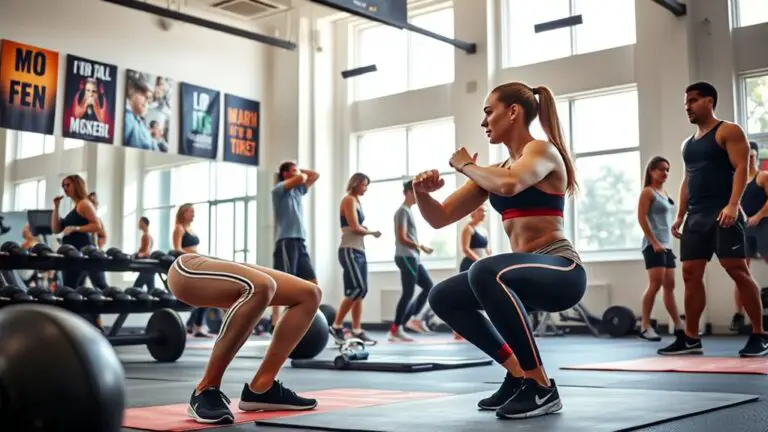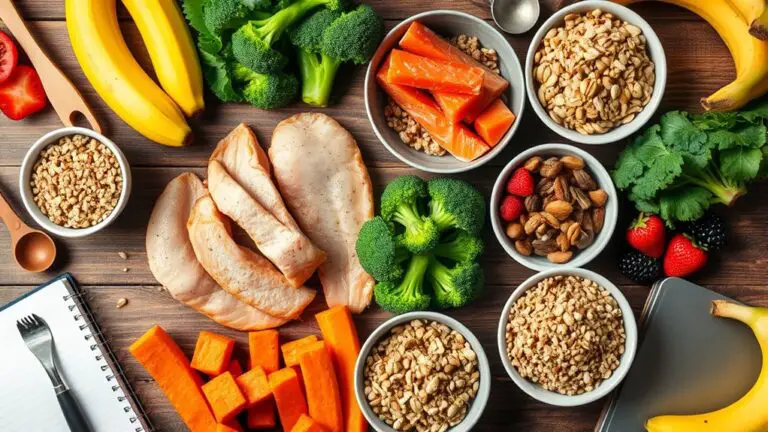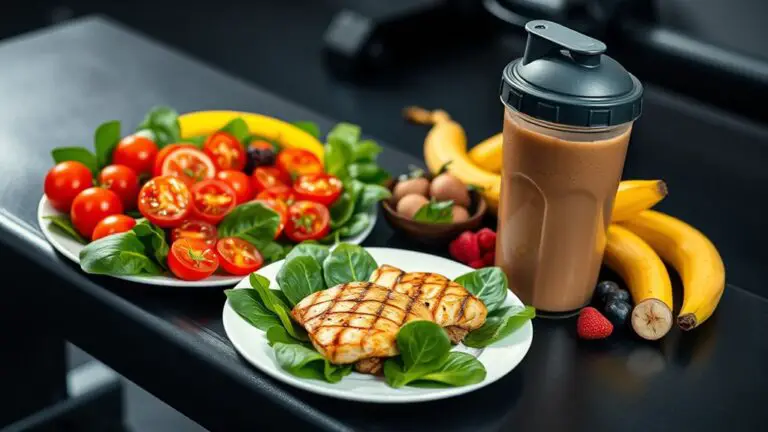How Classic Bodybuilders Used Nutrition for Gym Success

Classic bodybuilders used nutrition strategically to fuel workouts and aid recovery. They prioritized whole foods rich in lean proteins, complex carbohydrates, and healthy fats, fundamental for muscle growth. Meal timing was critical too; pre- and post-workout meals optimized performance and recovery. Hydration played an essential role in maintaining energy levels. Supplements complemented their diets, filling any nutritional gaps. To enhance your own training success, uncover more insights on macronutrients, meal timing, and iconic bodybuilder diets.
The Importance of Nutrition in Bodybuilding
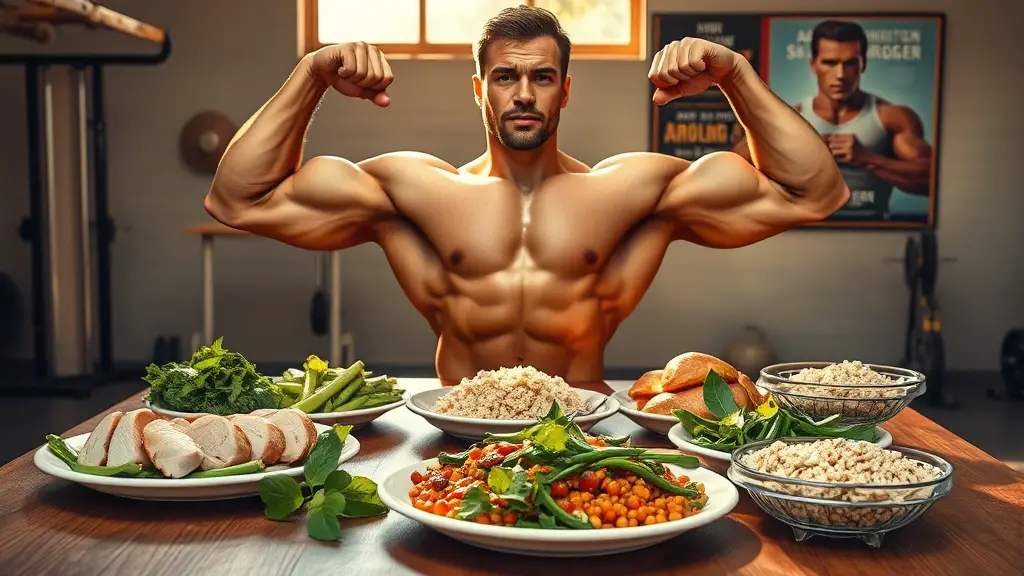
When it comes to bodybuilding, many might underestimate the critical role nutrition plays in achieving success. Proper nutritional strategies are essential for fueling your workouts and promoting recovery. You can’t rely solely on lifting weights; meal planning is equally important to guarantee you’re getting the right nutrients at the right times.
Start by prioritizing whole foods, such as lean proteins, complex carbohydrates, and healthy fats. These food groups support muscle growth and repair. Planning your meals in advance helps you stay consistent, making it easier to avoid unhealthy choices when hunger strikes.
Incorporate a variety of colorful vegetables and fruits to get essential vitamins and minerals that support overall health. Remember, it’s not just about calories but the quality of those calories. By focusing on effective nutritional strategies and meal planning, you’ll set yourself up for better gains and improved performance in the gym.
Macronutrients: The Building Blocks of Muscle
To build muscle effectively, you need to understand the role of macronutrients: protein, carbohydrates, and fats. Protein is essential for muscle growth, while carbohydrates provide the energy you need for intense workouts. Don’t overlook fats, as they play an important role in maintaining hormonal balance, which is essential for overall performance.
Protein for Muscle Growth
While you’re hitting the gym to build muscle, understanding the vital role of protein in your diet can make all the difference. Protein is essential for muscle repair and growth, and knowing the best protein sources and timing can enhance your gains. Aim for high-quality sources like chicken, fish, eggs, and legumes. Furthermore, timing your protein intake around your workouts can maximize muscle synthesis.
| Protein Source | Protein Content (per 100g) |
|---|---|
| Chicken Breast | 31g |
| Salmon | 25g |
| Eggs | 13g |
| Lentils | 9g |
| Greek Yogurt | 10g |
Incorporate these strategies, and watch your muscle growth soar!
Carbohydrates for Energy
Building muscle isn’t just about protein; carbohydrates play a significant role in fueling your workouts and supporting recovery. Carbs are essential energy sources that help maintain workout intensity and replenish glycogen storage after intense sessions. By incorporating strategies like carb cycling, you can optimize your energy levels and muscle growth.
Consider these key points about carbohydrates:
- Fuel for Performance: They provide quick energy for high-intensity training.
- Glycogen Storage: Adequate carbs enhance glycogen levels, vital for endurance.
- Recovery Support: Post-workout carbs help restore depleted glycogen.
- Workout Intensity: Increased carb intake can improve overall workout performance.
Balancing your carb intake can be transformative for your training and recovery, helping you achieve your bodybuilding goals.
Fats for Hormonal Balance
Although many people focus on proteins and carbohydrates for muscle growth, fats are equally essential for maintaining hormonal balance. Dietary fats play a significant role in supporting hormonal health, influencing testosterone and estrogen levels, which are fundamental for muscle development and overall well-being. Including healthy fats in your diet can improve nutrient absorption and support various bodily functions.
| Type of Dietary Fats | Examples |
|---|---|
| Saturated Fats | Coconut oil, butter |
| Monounsaturated Fats | Olive oil, avocados |
| Polyunsaturated Fats | Fatty fish, flaxseeds |
| Trans Fats | Processed snacks (limit) |
| Omega-3 Fats | Walnuts, chia seeds |
Incorporating a balance of these fats guarantees ideal hormonal health, aiding your gym performance and recovery.
Meal Timing: Fueling Performance and Recovery
When it comes to optimizing your gym performance and recovery, meal timing plays a crucial role that you shouldn’t overlook. Properly timed meals can enhance your energy levels and aid in muscle recovery. Here are some key points to reflect on:
Optimizing gym performance hinges on meal timing, enhancing energy and aiding in muscle recovery.
- Pre workout meals: Aim to consume a balanced meal rich in carbohydrates and protein 1-3 hours before your workout to fuel your body.
- Post workout recovery: Refuel with a meal or snack containing protein and carbs within 30-60 minutes after exercising to promote muscle repair.
- Hydration: Staying hydrated before, during, and after your workout is essential for performance and recovery.
- Consistency: Try to maintain a regular eating schedule to keep your energy levels stable throughout the day.
The Role of Supplements in Classic Bodybuilding

Supplements can play an essential role in your classic bodybuilding journey, helping you meet nutritional needs that diet alone might not fulfill. Understanding which important supplements to incorporate, along with their ideal timing and dosage, can greatly enhance your performance and recovery. Let’s explore how to effectively integrate these strategies into your routine for maximum results.
Essential Supplements Overview
While pursuing classic bodybuilding, understanding the role of crucial supplements can greatly enhance your performance and results. These supplements help bridge nutritional gaps and support your training regimen. Here’s a brief overview of key supplements to evaluate:
- Protein Powder: Aids muscle recovery and growth.
- Creatine: Boosts strength and enhances performance.
- Essential Vitamins: Support overall health and immune function.
- Minerals: Critical for muscle contraction and recovery, highlighting mineral importance.
Incorporating these supplements into your routine can help you optimize your nutrition. However, remember that they should complement a balanced diet rich in whole foods, rather than replace them. Focus on getting your essential vitamins and minerals from food first, and use supplements as needed to support your goals.
Timing and Dosage Strategies
Understanding the timing and dosage of your supplements can greatly impact your bodybuilding results. To optimize your gains, consider meal frequency and nutrient timing. Properly timed supplementation can enhance muscle recovery and growth. Here’s a simple guide:
| Time of Day | Supplement Type | Dosage Recommendation |
|---|---|---|
| Pre-Workout | Protein, Creatine | 20-30g protein, 5g creatine |
| Post-Workout | Protein, BCAAs | 20-30g protein, 5-10g BCAAs |
| Between Meals | Omega-3s, Multivitamins | 1-2g Omega-3s, as directed |
| Before Bed | Casein Protein | 20-30g casein protein |
Historical Diets of Iconic Bodybuilders
As you explore the historical diets of iconic bodybuilders, you’ll discover how their nutritional choices significantly influenced their training and overall success. These athletes often adhered to structured meal plans, focusing on whole foods to fuel their intense workouts. Remarkably, their diets varied widely, but common elements can be identified:
- Lean proteins like chicken, fish, and eggs for muscle repair
- Complex carbohydrates such as rice, oats, and sweet potatoes for energy
- Healthy fats from sources like nuts and avocados for overall health
- Ample fruits and vegetables to provide essential vitamins and minerals
The Science Behind Protein Consumption
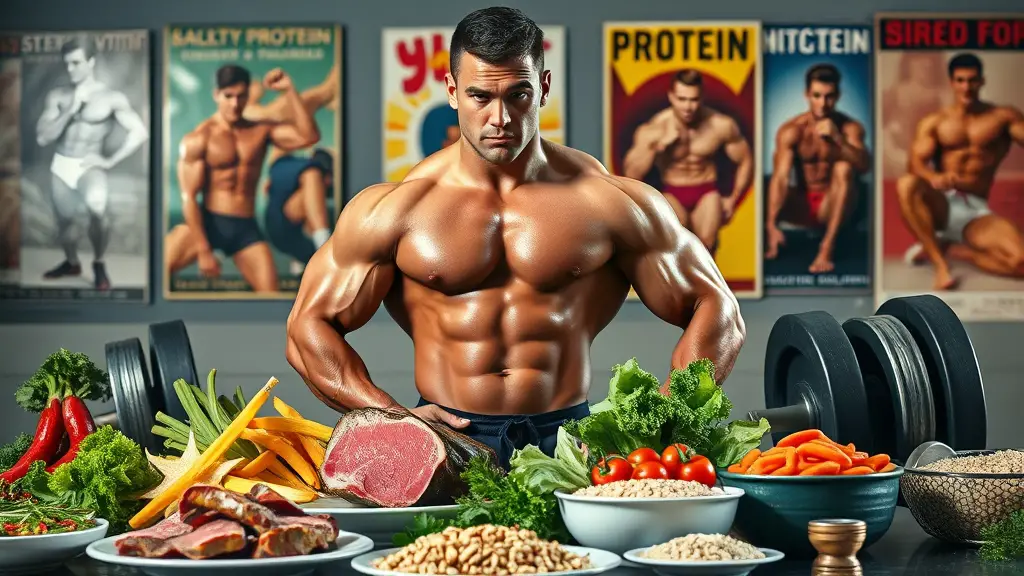
Protein plays an essential role in your fitness journey, especially when it comes to building and repairing muscle tissue. To maximize protein synthesis, it’s vital to consume high-quality protein from dietary sources like lean meats, dairy, or plant-based proteins. Timing also matters; consuming protein post-workout enhances muscle recovery by providing amino acids when your muscles need them most.
Additionally, understanding nutrient absorption can help you optimize your protein intake. Aim for regular doses throughout the day to support muscle preservation and growth, particularly during strength training. Studies suggest that around 20-30 grams of protein per meal can efficiently stimulate protein synthesis.
Carbohydrates: Energy for Intense Workouts
While you may focus on protein for muscle building, carbohydrates are equally essential for fueling your workouts. They play a vital role in replenishing glycogen storage, which is your body’s primary energy source during intense exercise. Without adequate carbs, your performance can suffer, leading to fatigue and decreased results.
Consider these key points about carbohydrates:
- Energy Source: Carbs provide quick energy, allowing you to push through challenging workouts.
- Glycogen Storage: Proper carb intake supports ideal glycogen levels, enhancing endurance.
- Carb Cycling: This strategy can help you manipulate your carb intake to maximize fat loss while maintaining muscle.
- Recovery: Post-workout carbs aid in replenishing glycogen and supporting recovery.
Incorporating the right amount of carbohydrates into your diet guarantees you’re energized and ready to tackle every workout. Remember, balance is key for achieving your fitness goals!
Fats: The Unsung Heroes of Nutrition
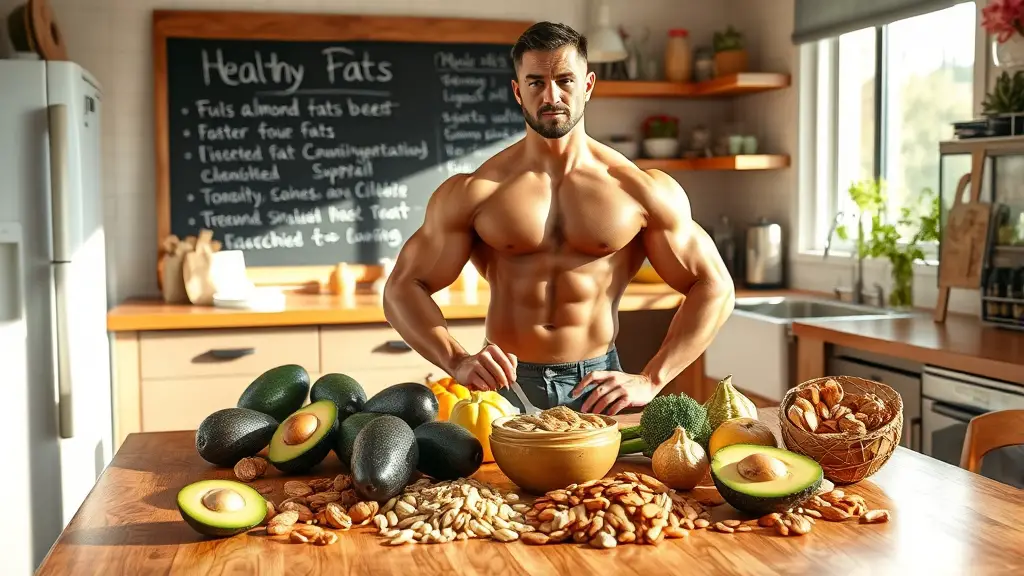
Many people overlook fats when considering their nutrition for gym success, but these macronutrients play an essential role in overall health and performance. Incorporating healthy fats into your diet can enhance fat metabolism, providing long-lasting energy for workouts. Key dietary sources of healthy fats include avocados, nuts, seeds, olive oil, and fatty fish. These foods are rich in essential fatty acids, which support hormone production and muscle recovery.
Additionally, healthy fats help with the absorption of fat-soluble vitamins like A, D, E, and K, vital for maintaining peak health. While some may fear fats due to their calorie density, remember that they can keep you satiated and prevent overeating. To maximize your gym performance, aim for a balanced intake of healthy fats, ensuring you fuel your body properly. Embracing fats can be a game-changer in your nutrition strategy for gym success.
Hydration: The Key to Optimal Performance
Hydration is essential for achieving ideal performance in the gym, as even mild dehydration can greatly impair physical and cognitive functions. To enhance your workouts, consider these effective hydration strategies:
- Drink water consistently throughout the day, not just during workouts.
- Incorporate electrolyte-rich beverages post-exercise to replenish lost minerals.
- Monitor your urine color; it should be pale yellow, indicating proper hydration.
- Adjust fluid intake based on training intensity and environmental conditions.
Maintaining proper hydration levels supports your electrolyte balance, vital for muscle function and recovery. Aim to drink about half your body weight in ounces of water daily, increasing this amount during intense training sessions. By prioritizing hydration, you’ll enhance your performance, improve endurance, and reduce the risk of fatigue. Remember, your body needs water to function effectively, so don’t overlook this critical aspect of your nutrition plan!
Frequently Asked Questions
How Did Classic Bodybuilders Calculate Their Daily Caloric Needs?
Imagine your body as a finely-tuned machine, where every calorie counts. Classic bodybuilders calculated their daily caloric needs using caloric formulas that accounted for their activity level, age, and weight. By understanding their daily intake requirements, they guaranteed they fueled their bodies properly to build muscle and enhance performance. They often adjusted their caloric intake based on training phases or goals, demonstrating a practical approach to nutrition tailored to their unique needs.
What Role Did Food Quality Play in Their Nutrition Plans?
Food quality’s essential in any nutrition plan. You should prioritize whole, nutrient-dense food sources like lean meats, whole grains, fruits, and vegetables. These provide essential vitamins and minerals that support muscle recovery and growth. Additionally, pay attention to nutrient timing; consuming protein and carbs around your workouts can enhance performance and recovery. By focusing on high-quality foods and ideal timing, you’ll maximize your results and fuel your body effectively.
Did Classic Bodybuilders Use Any Specific Diets for Cutting or Bulking?
When you think about bulking strategies, it’s easy to overlook cutting techniques. Classic bodybuilders mastered both, using specific diets to achieve their goals. For bulking, they often increased caloric intake with protein-rich foods, while cutting required a reduction in calories and careful macronutrient balance. They emphasized whole foods, timing meals around workouts, and maintaining nutrient density to guarantee muscle retention. Understanding these strategies can help you refine your own approach to bodybuilding.
How Important Was Meal Prep for These Bodybuilders?
Meal prep was essential for bodybuilders, as it helped guarantee they met their nutritional goals. By focusing on meal planning, you can effectively manage your portions, which is key for both cutting and bulking phases. This structured approach not only saves time but also minimizes the temptation to stray from your diet. With proper portion control, you’ll find it easier to stay on track and achieve your fitness objectives.
What Were Their Favorite Cheat Meals or Snacks?
When it comes to favorite cheat meals, classic bodybuilders often indulged in nostalgic snacks that reminded them of their youth. You might find them enjoying pizza loaded with toppings or a hearty burger with fries. They also loved sweet treats like milkshakes or a slice of cake after a long week of strict dieting. These cheat meals weren’t just indulgences; they provided a psychological boost, helping maintain motivation during intense training periods.

